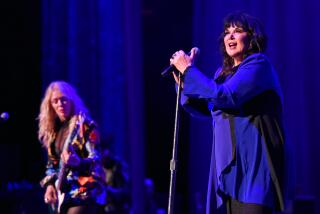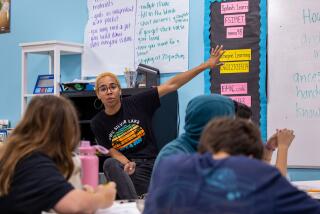A New Lesson on Women in History
- Share via
TEMPLE CITY — On the Western frontier, women married at 15, worked from daybreak till dark and sometimes shot wild game with better marksmanship than did men, according to the 130-year-old diary of an Oregon pioneer woman.
The diary was one of many primary sources used by Temple City teacher John Lopez to underscore the contributions of women for his eighth-grade social studies students at Oak Avenue Middle School.
Using speeches, diaries and historical accounts of famous women such as Dorothea Dix, Harriet Tubman and Susan B. Anthony fits well with the new literature-based social studies framework adopted last fall by the Temple City Unified School District. The curriculum stresses the historical contributions of women and minorities who traditionally have been underrepresented in textbooks.
“For many, many years men were writing the history and they were writing about their own accomplishments,” explained Lopez, who wore a Women’s History Month button on his shirt. “At some time recently, women began to say, ‘Hey, hold it, there are some things that we need to consider.’ ”
Many students, especially the girls, say this new approach to teaching history has boosted their confidence.
“It’s interesting to me because I’m a girl and for the first time I get to learn that women also had great discoveries and accomplishments,” said Lorraine Iniguez, 13.
But Lopez also showed his students the darker side of life for women in America’s early days. He explained that although half the population was female, women could not own property, speak in public, sign legal contracts or vote.
As the class was told, women did not gain the right to vote until the 19th Amendment was passed in 1920. And in the Declaration of Independence the Founding Fathers wrote that all men are created equal. Said Kiyomi Onogi: “It didn’t say anything about women and slaves.”
In one exercise designed to stimulate critical thinking, students read an 1855 speech by Lucy Stone calling for women’s rights. Then they broke into groups to discuss Stone’s belief that many women of the time married because of economic necessity.
“A woman who earns 3 1/2 cents per day marries a man for money,” said students Chris Chen and Wes Chan. However, “If she had money, she would marry a man for love and affection.”
Kiyomi and her classmates listened intently as Lopez played a tape re-enacting the historic Seneca Falls Convention of 1848, when about 100 women gathered in New York to demand equality under the law while men stood on the sidelines and jeered.
At its conclusion, women wrote their own declaration of independence and inserted the word “women” in strategic places, such as: We hold these truths to be self-evident: that all men and women are created equal.”
Asked whether they would have taken part in such a convention, some Oak Avenue students weren’t sure.
“I would have stayed home,” said Kim Nguyen. “I would have been pretty frightened by the intimidation of the men. I don’t think there would have been a big group behind me.”
But Lorraine disagreed. “There would have been a lot of women who wanted equal rights,” she said. “Ever since the beginning, men always thought they were greater than women. But if Eve had been created before Adam, then the men would have had this problem.”
Lopez also raised contemporary issues. Pointing to a chart in a history book, he asked the children to think of reasons why women still lag behind men in comparative salaries.
“Think about all the stuff we read and heard last week, and yet 100 years later, we still have an income disparity,” said Lopez, as the class hunkered down to write out answers. Many 13- and 14-year-old girls explained why they believed discrimination against women still exists:
“Women have to do other work, such as take care of the house, so they don’t have the whole day for a job,” said Deborah Hsu.
“I think it’s because many companies are still looking for men for the larger jobs,” Amy Britton wrote.
Lopez then asked what students could do to change the situation. Erica Cruz said she thought more women should seek higher education. But when Brian Facey said men earn more than women because they seek out jobs that pay more, some girls erupted in hoots.
“You never hear of a man giving up his job and staying home with the kids,” Darlene Tamanaha said.
“You tell ‘em, Darlene,” said Nickie Downey.
Lopez then asked his students to write essays about a female heroine.
“We’re talking about someone you know,” Lopez said, “someone who is part of our community and has been special in your life. You can choose anyone you want.”
Erica named her grandmother, who isn’t afraid to stand up for her beliefs. Sang Je wrote about his aunt, who came to the United States 10 years ago without knowing English and has graduated from college and works at Northrop.
Perhaps the most dramatic story came from Darlene, who recounted the story of a Hawaiian woman who saved her father’s life when, as a child, he fell out of the family’s 1931 Chevy.
“She picked him up and off the roadside and took him to a hospital,” Darlene wrote. “I feel she showed great courage in picking up my father. She was an ordinary Hawaiian housewife, but she did a very extraordinary and brave thing. She has never won any awards or . . . made the front page of any news report, but she is a heroine in my heart and mind.”
More to Read
Sign up for Essential California
The most important California stories and recommendations in your inbox every morning.
You may occasionally receive promotional content from the Los Angeles Times.













